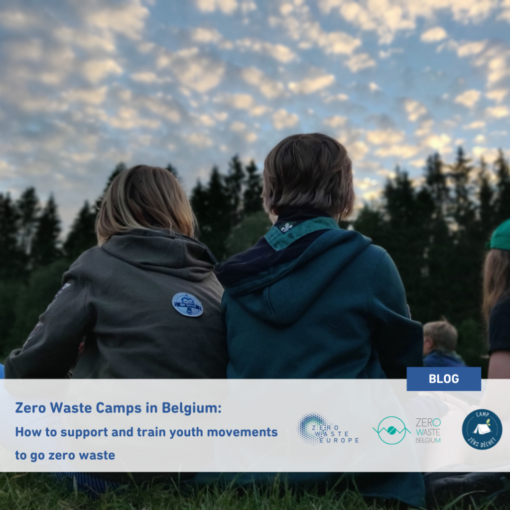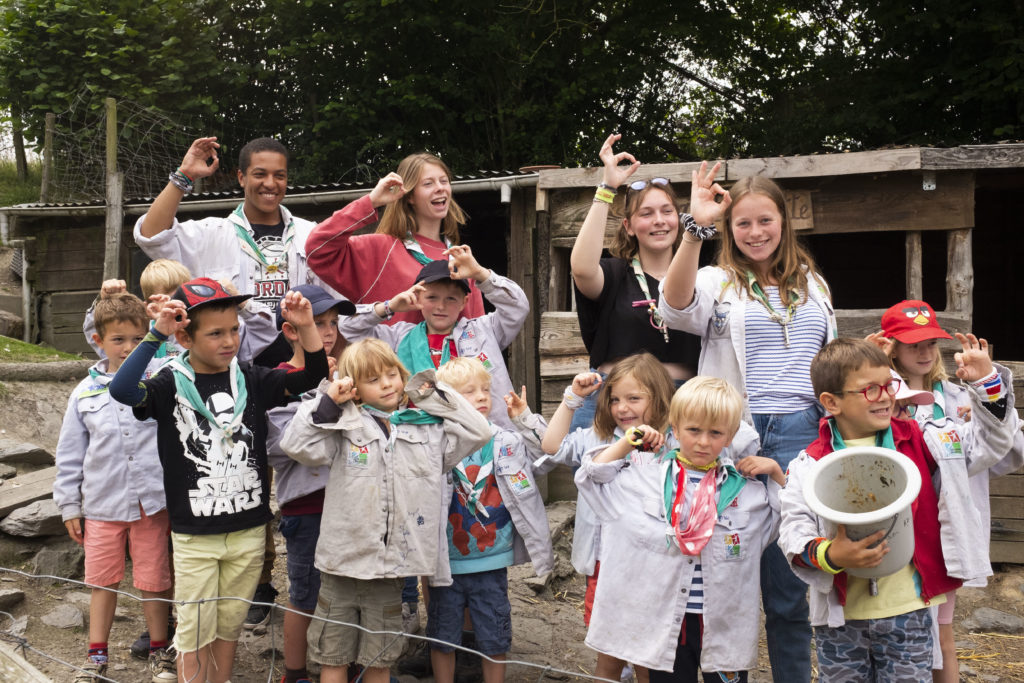
Zero Waste Camps in Belgium: How to support and train youth movements to go zero waste
Since 2018, Zero Waste Belgium has been supporting youth movement groups in the country to help reduce their waste as part of the ‘Camp Zero Dechet’ (Zero Waste Camp) project.
The project has been organised together with local partners including:
- Fristouille (supporting on sustainable food)
- Empreintes (specialised in environment awareness towards young audiences);
As well as the support of youth movement federations, including:
- Les Guides Catholiques de Belgique,
- La Fédération Nationale des Patros,
- Les Scouts,
- Les Scouts et Guides Pluralistes de Belgique.
The Camp Zero Dechet (zero waste) project provides a support programme to equip camp leaders with the skills and knowledge to reduce their waste during the camp, as well as making the whole experience more sustainable and environmentally-focused.
Within Belgium, there is a deep history of having summer camps and activities designed for all young people from the age of 4 upwards. They offer an opportunity for young people to get together and learn practical life skills, as well as an appreciation of the natural environment. They’re designed to help build confidence and leadership skills for the Belgian young people who attend. Activities are organised most weekends and the camps are held during the summer holidays.
The camps are extremely important for the Belgian youth movement as it often represents the highlight of the year. Within the Zero Waste Camp project, Zero Waste Belgium and its partners support leaders within the youth movement to organise a dedicated zero waste camp. The camps have three dedicated goals:
- Less waste: By putting a few actions into place quickly, the results can be dramatic. Most camps reduce their waste by over 50%
- More connections: Zero waste, beyond the bins, is above all about learning how to create a more sustainable camp experience
- More appreciation: By providing opportunities to be in and respect the natural world, including how they can limit their waste and the importance of this, the camps give a positive vision of environmentally-focused actions that young people can take today.
The support provided by Zero Waste Belgium and the partners includes several steps:
- Before the camp: An awareness raising session is organised for camp leaders that takes place in small groups. The session provides these young people with the knowledge on why a zero waste approach is needed, as well as equipping them with the skills and tools needed to transmit the zero waste message to the participants, to the parents, and to the rest of their staff.
- Advanced training modules are also provided to camp leaders based upon 6 key focus areas (participation, food, waste management, hygiene, material choice and mobility), which is integral to the success of the project. The training helps camp leaders establish their targets and objectives for waste reduction during the camp.
- During the camp: A visit to the camp is organised in order to be able to analyse and assess the impact of their zero waste approach and efforts, as well as to provide support and assistance in the implementation of the zero waste policies.
- After the camp: A meeting for of camp leaders is organised, where they reflect on their experiences and lessons learned throughout the whole experience.
Check out the full overview of the training offered throughout this project here.

While just 9 groups were supported in 2018, in 2020 this dramatically increased to over 40 groups that now have taken up the challenge of implementing a zero waste camp experience.
Results
The data collected from this initiative shows that, with the right support, all groups were able to reduce their trash.
The 2020 edition shows an average 66% reduction in the camp’s waste compared to the previous years.
A two-week camp with about 40 people produced on average just 4 bags of residual waste, in comparison to the 12 bags generated in previous years. It should also be noted that this drop in residual waste didn’t also lead to an increase in materials separated for recycling, showcasing the impact that this project has had on waste prevention, rather than just recycling.
Beyond the drastic reduction of camp waste, feedback from the groups shows a real success in terms of awareness and behavior change. The concrete actions carried out by the majority of the camps prove it – increased contact with local businesses, the implementation of sustainable food menus, more preference of home-made food and proper management of bio-waste.
Many actions are understood and integrated by the motivated youth leaders. In 2020, more than 70 facilitators were trained and more than 1400 young people were directly reached during the project, an impact that is multiplied further when you consider the indirect influence this has on the parents and wider family indirectly, their parents.
“The groups are incredibly motivated and passionate. They take the challenge to go zero waste for their camp and make it a two-week utopia. The most incredible thing is that very often they would go much further than what they expected. They are the living proof that young people are eager to live a more sustainable life if you give them the keys. And then pass it on to the next generation.” – Marc Sautelet, Camp Zero Dechet project manager
Good practices to organise a zero waste camp learnt during the project include:
- Motivate your staff with a clear vision and purpose for the project;
- Appoint a leader within the team to be the focal point throughout;
- Decide from the start on a target for the number of garbage bags you aim to have;
- Target the parents to make them aware and bring them on the journey;
- Decide in advance on the food menu for the camp;
- Select your producers and contact them well in advance;
- Anticipate and prepare for the logistics for bulk shopping;
- Have large enough containers to collect leftover food for reuse;
Conclusions
The Camp Zero Dechet project was designed to target young people first and foremost, getting them to rethink their personal consumption choices. We believe this experience can have a long-term effect on their attitudes regarding waste and why it is important to reduce it drastically.
This project shows that, with clear support and training, individuals can very easily reduce their waste by a significant amount. In Belgium, each person generates an average of 150kg of waste each year..
If you apply the same reduction to the whole population, Belgian citizens would produce only 50 kg a year. This would align with what is being achieved in some of Europe’s best performing Zero Waste Cities, achieved with only a few weeks of training.
Pauline Talbot is the Project Manager at Zero Waste Belgium.